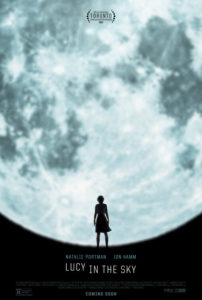Film Review: “Lucy in the Sky” Is a Narrative Black Hole
Written by: Christopher Llewellyn Reed | October 10th, 2019

Lucy in the Sky (Noah Hawley, 2019) ½ out of 4 stars.
Lucy is inspired, Lucy is inspiring. She’s also driven, stunned, passionate, angry, giddy, confused, focused, manic, crazy, smart, successful, failing, at-a-loss spiraling-out-of-control allovertheplace goingamileaminuteand quicklylosingthethreadof thingsandunabletodifferentiate betweenwhatisrealandwhatisnot. She’s a mess, just like that last sentence. And yet somehow, as written, she is meant to be a dynamic protagonist. I’m as much a fan of damaged lead characters as anyone, but I’d like to have some understanding of the why, how and who of it all. As presented in Lucy in the Sky (and yes, there are diamonds on the way via a mandatory, yet somehow completely unnecessary, cover of the Beatles song), from director Noah Hawley (the showrunner of FX’s Fargo), she could be anybody, from any place, in any profession, rather than the real-life astronaut on which she is based. She is a void, filled by a mannered performance from Natalie Portman, in which she recalls her equally fidgety turn in the 2018 Vox Lux, only now with a southern twang. In space, apparently, everyone can hear you scream.*
We meet Lucy at the tail end of a Space Shuttle mission, her eyes filled with wonder as they gaze on Earth. Once back home, she seems unable to return to normal, life with her super-nice-guy husband, Drew (a purposefully bland Dan Stevens, The Ticket), a complete bore. Fortunately, there is competition for a spot on a future mission to distract, along with the charms of hot guy Mark (played by hot guy Jon Hamm, Beirut), as long as the only other woman in the running, Erin (Zazie Beetz, Joker), doesn’t take her place (both on the shuttle and in the arms of Mark). Since the tragedy of the story is telegraphed from the beginning, and since the actual events are not that historically distant, we know where this is going. If only the execution held some interesting surprises.

It doesn’t. Worse, Hawley and company apply a feminist stamp on the soggy narrative. I am 100% certain that women face a much tougher time of it in all professions, and that NASA is probably harder than most, but the fact remains that Lucy, as we see her in this film, is completely nuts. Yes, most of the men are terrible, but who in their right mind would want this particular person up in near-Earth orbit, Hawley’s obsession with photographing half the story from an overhead angle notwithstanding? The bigger question, however, is who in their right mind would want to watch as scattered a film as this? Better to lose oneself in a black hole.
*My apologies to Alien

